We Remember Pope Benedict XVI
The death of Pope Emeritus Benedict XVI has unleashed a flood of assessments of his legacy as pontiff. It will be years, and probably decades, before the full scope of his magisterium will be grasped, in large measure because his immense body of teaching and preaching is still being absorbed.
While I don’t have a privileged perspective on Benedict’s papacy as a whole, I was privileged to receive his extraordinary support in founding the Hildebrand Project. Without Benedict’s early and repeated support, it is possible the Hildebrand Project would not have attracted the intellectual and financial support that has enabled it to thrive.
Popes are usually judged by their major achievements (and failures); consequently, many commentators are likely to consider papal support of small initiatives fairly immaterial. I think this is mistaken, not only because these initiatives often have significant ramifications of their own, but also because they provide small glimpses into the priorities of a papacy.
The Early Years of the Hildebrand Project
The Hildebrand Project was founded in February 2004. At the time, its primary goal lay in the English translation and publication of the German writings of Dietrich von Hildebrand. I was the young founder, age 25. I had studied philosophy and pursued a career in violin performance; my background prepared me to love the good, the true, and especially the beautiful, but there was little in it to prepare me to undertake institution-building and fundraising. It was a blessed ignorance, nourished by my youthful confidence that almost everything is possible with vision, passion, and hard work.
At the time, Alice (Lily) von Hildebrand was extremely encouraging to me, yet (as I later learned) not completely confident that this young man knew what he was getting himself into and whether he could succeed. Still, she generously supported my bold (or were they brash?) plans. I had enough sense to realize that I needed a group of distinguished persons to lend credence to the nascent Project, so I created our Advisory Council with the idea that I would invite known persons who exemplified different aspects of Hildebrand’s legacy: groundbreaking philosopher, penetrating religious author, ardent lover of beauty, and heroic political witness.
Among the very first we invited was a certain Joseph Cardinal Ratzinger. Lily sent the letter in her name. The response was swift. “I would be honored to serve, but given my role in the Church, I cannot join the Advisory Council, but something honorary I would not exclude.” Thus was born the title, Honorary Member. I have a lovely brief letter dated October 2004, saying:
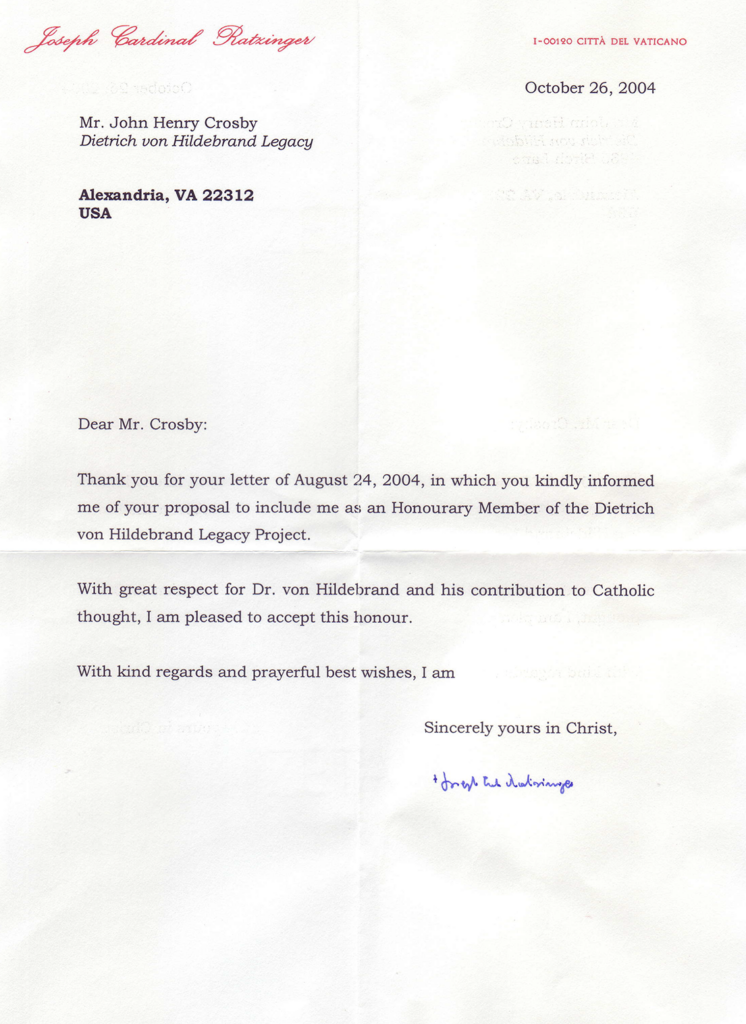
I used to say that with Cardinal Ratzinger’s “Yes,” the Hildebrand Project was born. Perhaps I should say that his “Yes” confirmed in me the sense that this work was not just an interesting scholarly venture, but a mission that could serve the Church and the world in crucial ways. Since that time, I have never looked back.
The Holy Father’s Contribution to the Project
On April 19, 2005, Cardinal Ratzinger was elected pope. I will never forget the moment when he first appeared on the balcony to be presented to the world as Benedict XVI. I was overcome with joy! I was also certain this marked the end of his involvement with the Hildebrand Project. I was grateful, but ever so slightly disappointed. After all, we were just getting underway.
In the fall of 2005, I had the chance to submit a proposal to the Papal Foundation, an American foundation that provides support to crucial papal charitable priorities. It was a long shot, but I was hopeful. Imagine my surprise and delight when we received a sizable grant that became some of the most crucial early-stage funding we received. I assumed the Holy Father gave his blessing to all the grants made by the Papal Foundation, but I did not think he played an active role in the review process.
In June 2006, I had the chance to greet the Holy Father at one of his Wednesday audiences in Rome. The heat was oppressive and the pope looked tired as he worked his way down the line of well-wishers, many of whom handed him gifts. I had been rehearsing what I would say in my 30 seconds, and I had decided to speak in German. I said, “Holy Father, thank you for your generosity through the Papal Foundation. Your support is deeply appreciated.” Without a moment’s hesitation, he replied, “I put that grant through myself.” I was speechless. I could only stammer “Alice von Hildebrand sends her warmest greetings,” to which he asked about her health. His parting words were, “Sie ist eine edle Frau—she is a noble lady.”
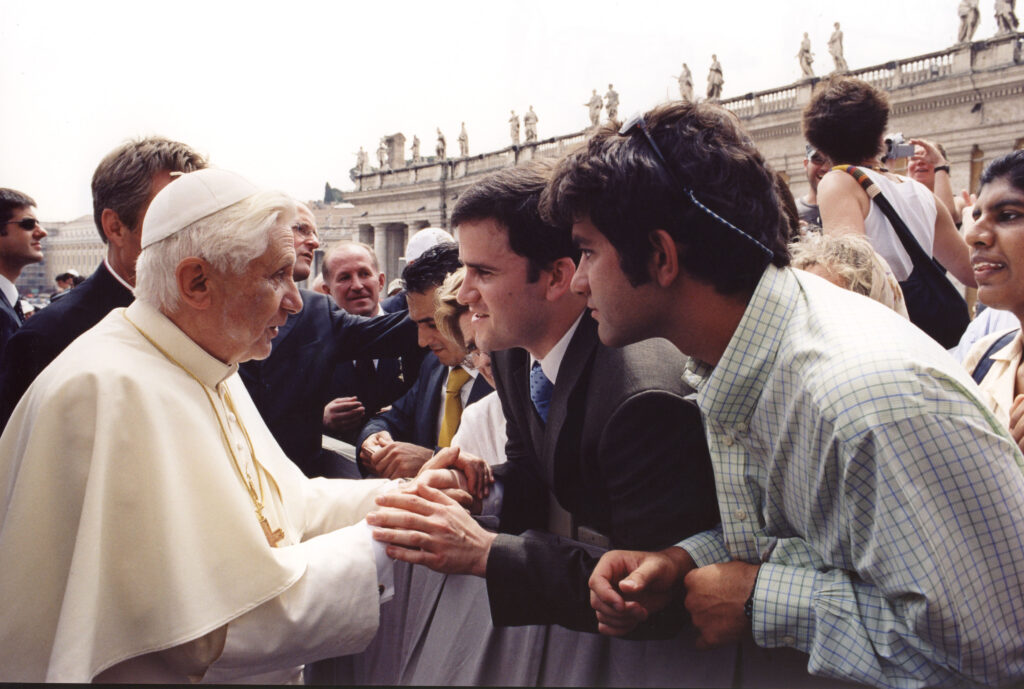
Such words would humble anyone, and certainly Lily was deeply touched. But it also fired in us both a certain boldness: would the Holy Father perhaps receive us in a private audience? Again, she wrote a letter to the Holy Father, and within a few weeks, we had a reply: please come and here are three possible dates.
Our Audience with Pope Benedict XVI
After many adventures, which included a memorable visit to San Francesco, Dietrich von Hildebrand’s childhood home in Florence, Lily and I arrived in Rome in March 2007 in the company of our dear friend, Patricia Lynch. A close friend of Lily’s and a faithful Hildebrand Project trustee, Pat had graciously agreed to serve as travel companion to Lily, who was then 84.
Our audience with Pope Benedict was set for Monday, March 26, on which the Feast of the Annunciation was observed that year. Two groups were ahead of us, ultimately causing us to wait for at least an hour. Lily and Pat, more pious than me, began reciting a rosary while I prayed in decades of silent pacing. I kept telling myself that the Holy Father had an “obligation to be charitable.”
All at once, it was our turn. I think Monsignor Georg Gänswein, personal secretary to the Holy Father, greeted us just before we went in, but perhaps it was Archbishop James Harvey, the Prefect of the Papal Household. The door swung open and there stood the Holy Father to welcome us. Lily bent to kiss his ring, as did Pat and I. From the very first moment, there was a warmth and a spirit of friendship between Lily and the Holy Father as can only exude between Christian friends. There was something so dear and childlike when Lily, still in the doorway, said, “Your Holiness, I am older than you,” to which he said with a smile on his face, “Yes, I know.” After a group photo, the room was cleared, leaving just Lily and me with the Holy Father.
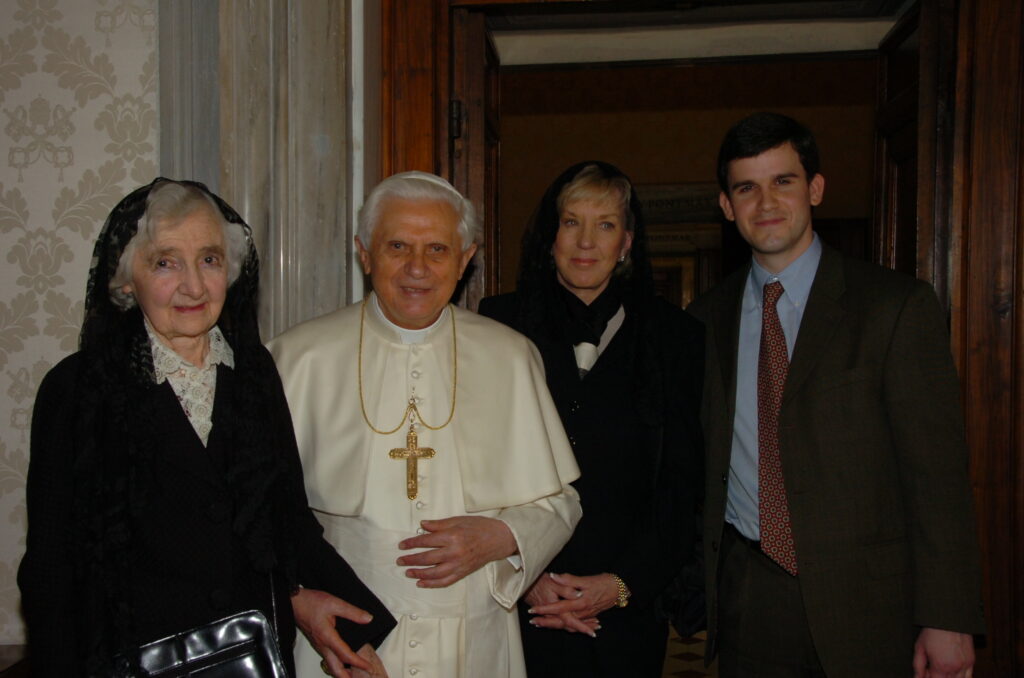
Though the audience remains firmly etched in my mind, with certain aspects still clear as yesterday, somehow the overall memory remains with me as if it were a dream. We began the conversation in German, then shifted to English, a mercy for me, since I knew I could speak more expressively in English than in German. The very first thing I did was to give the Holy Father copies of the Dietrich von Hildebrand LifeGuide and of The Heart, both of which had just been published. Taking The Heart, the Holy Father remarked, “Ah, the young people will like this.” This was also my opportunity to thank the Holy Father for his financial support through the Papal Foundation, which had been so critical for our early success.
Lily too spoke about various themes. In fact, she arrived with a full agenda! At one point, she asked the Holy Father to write a new encyclical on Christian philosophy with a special focus on encouraging the study of philosophers, such as her husband, who were not primarily disciples of St. Thomas Aquinas. The Holy Father’s response was very interesting, considering that his intellectual roots are in St. Augustine and St. Bonaventure. Referring to the encyclical Aeterni Patris (1879), in which Pope Leo XIII strongly encouraged the study of St. Thomas, Benedict remarked, “the encyclical was absolutely necessary at the time.” Various other topics came up, some of them highly sensitive in nature (e.g., the appointment of bishops). I remember being surprised at how candid the Holy Father was in his remarks.
Aside from thanking the Holy Father and presenting him with our first publications, I wanted to discuss various matters concerning the future of the Hildebrand Project. I had a particular request for him, which I asked for along the following lines. I said: “Dear Holy Father, we have been blessed by numerous friends and supporters, many of whom have been impressed to know of your involvement in our work. Yet, I think there would be even greater interest, allowing our work to flourish even more, if they were to feel a concrete collaboration with you. Would you be willing to write for me a personal letter, expressing not only your support of our work but also explaining in just a few lines, the reason for your support?” And without any hesitation, he replied, “I would be happy to. Send me a letter.”
Well, send him a letter I did, and, one can only imagine my surprise when just a month later a courier from the Papal Nunciature in Washington, DC arrived at my home in Alexandria, Virginia. I knew immediately what it must contain, though I could hardly believe it. My hands were shaking and I was so beside myself with excitement that I had to ask a friend to open the packet and read it to me. What I received in every respect exceeded what I had hoped for, and so it is with joy and an ongoing sense of indebtedness to the Holy Father that I share his letter with you here.
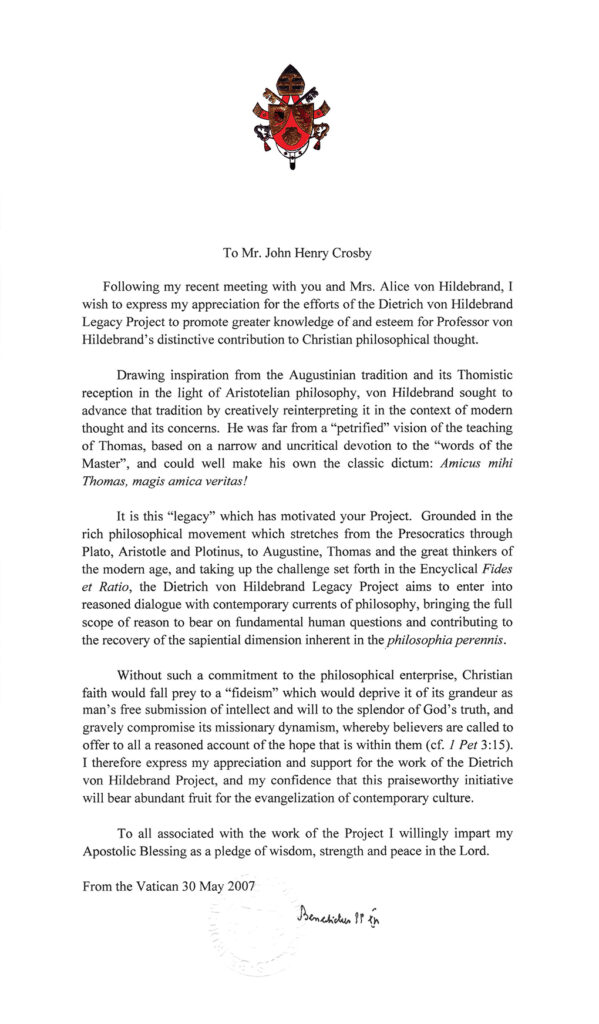
Nunc Dimittis
But let me return to the audience with Pope Benedict. It was now time for us to go. As we were getting up, Lily dropped one of her gloves onto the floor. Quick as a flash, Pope Benedict stooped to pick it up. He did it so naturally that it clearly did not cross his mind to do otherwise. We began walking toward the door, Lily holding the hand of the Holy Father. “You have no idea what a joy it is to see you,” she said. And twice, “Now I can truly say my Nunc dimittis,” referring to the words of Simeon in the Temple, “Now dismiss your servant according to your word in peace, for my eyes have seen your salvation.”
It must have been after noon. Various members of the Holy Father’s staff appeared in the room. I remember Archbishop Harvey standing behind the Holy Father, and I am certain that Monsignor Gänswein had also entered. Others were present as well. Then came the most memorable moment of all. We stood there, Lily still holding the hand of the Holy Father, with members of the papal household looking on. She could not let go. She was overjoyed. “If I could sing all of Mozart, Beethoven, and Schubert, it would not suffice to express my joy,” she said. There was peace and serenity in the room, and joy and expectancy.
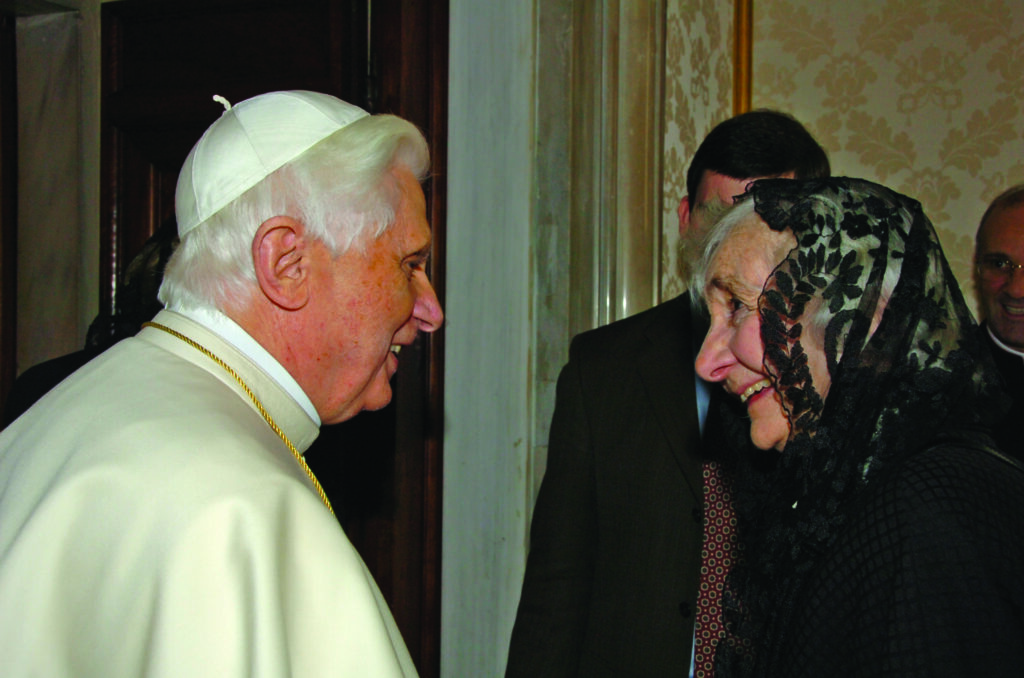
I realized then that she saw with the eyes of faith, and in this, her vision was transformed. The man she saw was not just the former Joseph Ratzinger, whom she had known over many years; rather, she saw the one whom, in faith, she understood to be Christ’s representative on earth. It was a revelatory moment, a moment of grace, and I think that everyone in the room saw the Holy Father as she did. I certainly did.
Rest in peace, dear Holy Father.

John Henry Crosby
Founder & President
